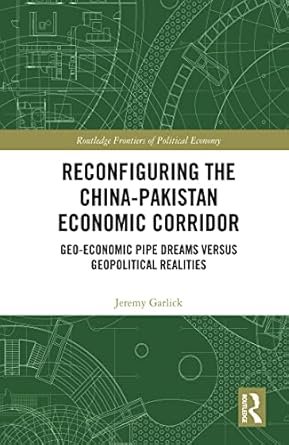Reconfiguring the China-Pakistan Economic Corridor by Jeremy Garlick provides an in-depth analysis of one of the most ambitious infrastructure projects of the 21st century. The book delves into the multifaceted impact of the CPEC on both China and Pakistan, examining economic opportunities, geopolitical power shifts, and potential challenges. Garlick explores how this vast network of roads, ports, and energy projects is more than just an economic initiative; it’s a cornerstone of strategic alliances that influence global trade and regional dynamics. With detailed research and expert insight, Garlick’s work sheds light on the long-term effects of the CPEC on international relations and economic landscapes.
Reconfiguring the China-Pakistan Economic Corridor
₨899₨1,299
Reconfiguring the China-Pakistan Economic Corridor by Jeremy Garlick analyzes the strategic, economic, and political implications of the CPEC. It explores how the project affects both nations’ regional influence and global economic power, offering a nuanced look at its potential outcomes.
Related products
-
Change We Can Believe In
₨1,365Change We Can Believe In by Barack Obama outlines his vision for America’s future. Covering topics like healthcare, education, and climate change, Obama offers practical solutions and a hopeful message for progress, inspiring readers to believe in collective action and change.
₨1,645 -
Life 3.0: Being Human In the age Of artificial Intelligence
₨2,150This is the most important conversation of our time, and Tegmark s thought-provoking book will help you join it Stephen Hawking
THE INTERNATIONAL BESTSELLER. DAILY TELEGRAPH AND THE TIMES BOOKS OF THE YEAR
SELECTED AS ONE OF BARACK OBAMA S FAVOURITE BOOKS OF 2018₨2,545 -
How to Lose a Country The SEVEN Steps from Democracy to Dictatorship
₨1,495Ece Temelkuran examines how democracies slide into authoritarianism in How to Lose a Country. Drawing on global examples, she outlines seven warning signs of political decay, urging readers to resist apathy and protect democratic values through vigilance and action.
₨1,795 -
PAKISTAN AT THE CROSSROADS
₨2,500Pakistan at the Crossroads is a collection of essays analyzing Pakistan’s political, social, and economic challenges. Edited by Christophe Jaffrelot, it explores issues like governance, extremism, and geopolitics, offering insights into the country’s uncertain future and regional implications.
₨3,000 -
How democracies die
₨1,320How Democracies Die by Steven Levitsky explores the gradual decline of democracies around the world, focusing on the ways authoritarian leaders exploit democratic institutions. Levitsky analyzes the signs of democratic erosion and offers insights into preserving democratic values and systems.
₨1,475 -
Money,Greed and God
₨999Jay W. Richards debunks myths about capitalism and explores its compatibility with Christian values. Money, Greed, and God advocates ethical capitalism as a force for good, offering a balanced perspective on faith, economics, and societal progress.
₨1,500 -
Reconciliation: Islam, Democracy, and the West
₨2,900Benazir Bhutto’s Reconciliation is a compelling analysis of the relationship between Islam, democracy, and Western values. Combining historical insights and political perspectives, she advocates for bridging divides and fostering mutual understanding to achieve global peace and stability.
₨3,445 -
Why Nations Fail: The Origins Of Power, Prosperity, And Poverty
₨2,250Brilliant and engagingly written, Why Nations Fail answers the question that has stumped the experts for centuries: Why are some nations rich and others poor, divided by wealth and poverty, health and sickness, food and famine?
Is it culture, the weather, geography? Perhaps ignorance of what the right policies are?
Simply, no. None of these factors is either definitive or destiny. Otherwise, how to explain why Botswana has become one of the fastest growing countries in the world, while other African nations, such as Zimbabwe, the Congo, and Sierra Leone, are mired in poverty and violence?
₨2,545









